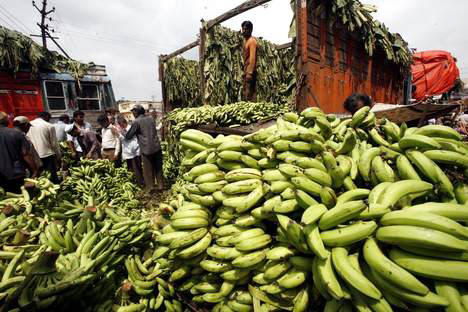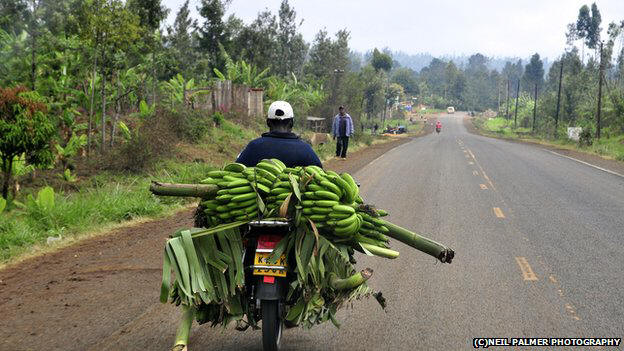![]() Nickerie.Net,
woensdag 31 oktober 2012
Nickerie.Net,
woensdag 31 oktober 2012
Bananen kunnen in de toekomst aardappelen vervangen
Door de wereldwijde klimaatverandering wordt de banaanfamilie een steeds belangrijkere bron van voeding voor miljoenen mensen. De vrucht zou in de toekomst wel eens de aardappel kunnen vervangen, blijkt uit een nieuw onderzoek waar de BBC over schrijft.
 Bananentrossen
op een markt in Bhopal, India.
Bananentrossen
op een markt in Bhopal, India.
In opdracht van de voedselveiligheidscommissie van VN-landbouworganisatie FAO onderzochten wetenschappers wat de klimaatverandering voor een effect kan hebben op 22 van 's werelds belangrijkste landbouwgrondstoffen.
De wetenschappers verwachten dat in veel ontwikkelingslanden de drie grootste gewassen - maïs, rijst en tarwe - zullen afnemen. De aardappel, die het beste groeit ondere koudere klimaatomstandigheden, kan ook lijden onder de klimaatveranderingen. Hierdoor ontstaat ruimte voor het kweken van bepaalde rassen van bananen.
'Het is niet perse dé oplossing, maar voor kleine boeren kan het in de toekomst een goede optie zijn', vertelt Philip Thornton, een van de onderzoekers, aan BBC.
Een van de vervangers kan, met name in het zuiden van Azië, de cassave zijn. De eetbare wortelknol is goed bestand tegen klimaatveranderingen.
Volgens Bruce Campbell van de Climate Change, Agriculture and Food Security research group gebeurde een soortgelijke verandering in de voedingsgewoontes van de mens al eerder. 'Twee decennia geleden at bijna niemand rijst in bepaalde delen van Afrika, nu eet iedereen het. En dat kwam omdat het makkelijker te verkrijgen en te bereiden was. Dat soort veranderingen zullen in de toekomst ook weer voorkomen.'
Bananas could replace potatoes in warming world
Climate change could lead to crops from the banana family becoming a critical food source for millions of people, a new report says. Researchers from the CGIAR agricultural partnership say the fruit might replace potatoes in some developing countries. Cassava and the little-known cowpea plant could be much more important food crops as temperatures rise. People will have to adapt to new and varied menus as traditional crops struggle, say the authors. Continue reading the main story “Start Quote When the farmers see the problems they are having with production, they really are willing to shift” Bruce Campbell CCAFS
Responding to a request from the United Nations' committee on world food security, a group of experts in the field looked at the projected effects of climate change on 22 of the world's most important agricultural commodities.
 Blooming
bananas
Blooming
bananas
They predict that the world's three biggest crops in terms of calories provided - maize, rice and wheat - will decrease in many developing countries.
They suggest that the potato, which grows best in cooler climates, could also suffer as temperatures increase and weather becomes more volatile.
The authors argue that these changes "could provide an opening for cultivating certain varieties of bananas" at higher altitudes, even in those places that currently grow potatoes. Cassava Cassava could help meet food needs in South Asia
Dr Philip Thornton is one of those behind the report. He told BBC News that while bananas and plantains also have limiting factors, they may be a good substitute for potatoes in certain locations.
"It's not necessarily a silver bullet, but there may be places where as temperatures increase, bananas might be one option that small-holders could start to look at."
The report describes wheat as the world's most important plant-derived protein and calorie source.
But according to this research, wheat will face a difficult future in the developing world, where higher prices for cotton, maize and soybeans have pushed wheat to marginal land, making it more vulnerable to stresses induced by climate change.
One substitute, especially in South Asia, could be cassava - which is known to be tolerant to a range of climate stresses.
But how easy will it be to get people to adjust to new crops and new diets?
Bruce Campbell is programme director of the Climate Change, Agriculture and Food Security research group (CCAFS) which co-ordinates work among leading institutions around the world. He told BBC News that the types of changes that will happen in the future have already happened in the past.
Protein under pressure
"Two decades ago there was almost no rice consumption in certain areas of Africa, now there is. People have changed because of the pricing: it's easier to get, it's easier to cook. I think those sort of shifts do occur and I think they will in future." Continue reading the main story About bananas
There are hundreds of types of banana plants but not all actually produce fruit They grow on plants that are giant herbs and are part of the Musaceae family Plantains are starchy like a potato, not sweet like a regular banana Organised banana plantations have been traced back to China in 200 AD Alexander the Great brought them back from India after his conquest in 327 BC Over the centuries they have been called banna, ghana and funana
One of the big concerns among researchers is how to tackle the need for protein in the diet. Soybeans are one of the most common sources but are very susceptible to temperature changes.
The scientists say that the cowpea, which is known in sub-Saharan Africa as the "poor man's meat" is drought-tolerant and prefers warmer weather and could be a reasonable alternative to soya. The vines of the cowpea can also be used as a feed for livestock.
In some countries, including Nigeria and Niger, farmers have already moved away from cotton production to growing cowpeas.
There are also likely to be developments animal protein sources says the report, including a shift to smaller livestock.
"This is an example of something that's happening already," said Dr Campbell. "There's been quite a shift from cattle keeping to goat keeping in southern Africa in face of droughts - when the farmers see the problems they are having with production, they really are willing to shift.
"Change is really possible. It's not just a crazy notion."
| Bron(nen) / Copyright: | |
|
Nickerie.Net/Volkskrant / BBC |
31-10-2012 |
|
|
Email: info@nickerie.net
Copyright © 2012. All rights reserved.
Designed by Galactica's Graphics